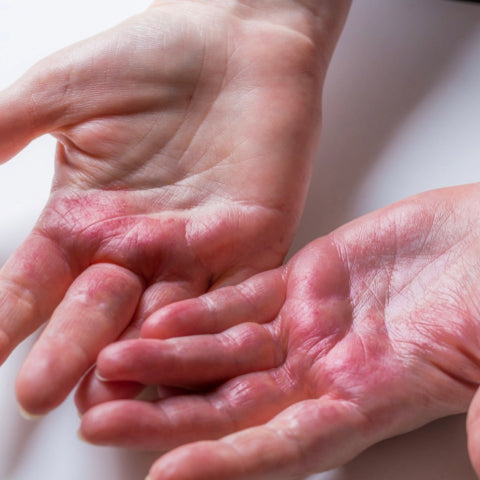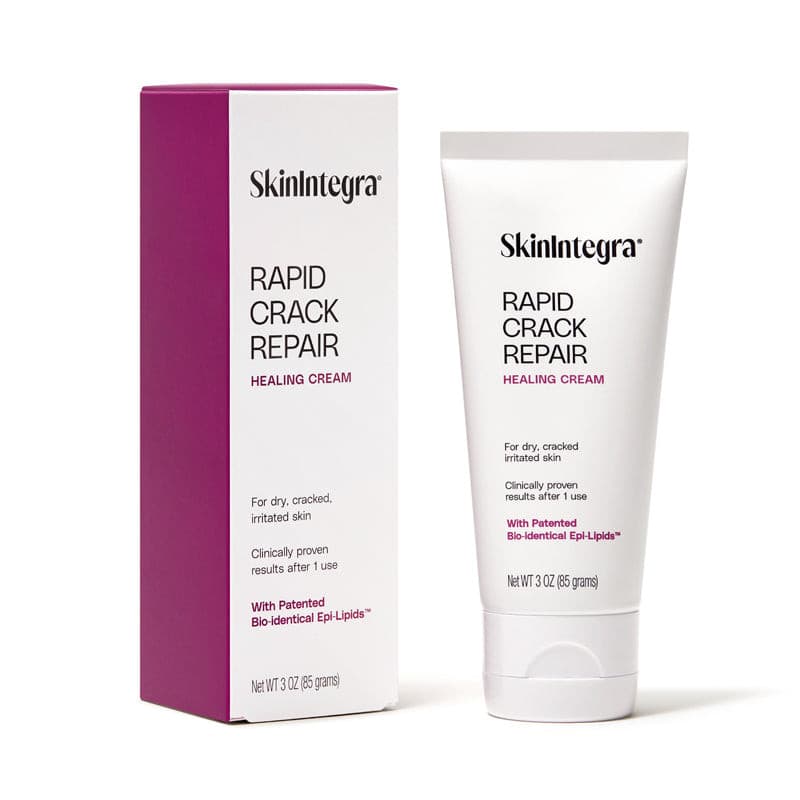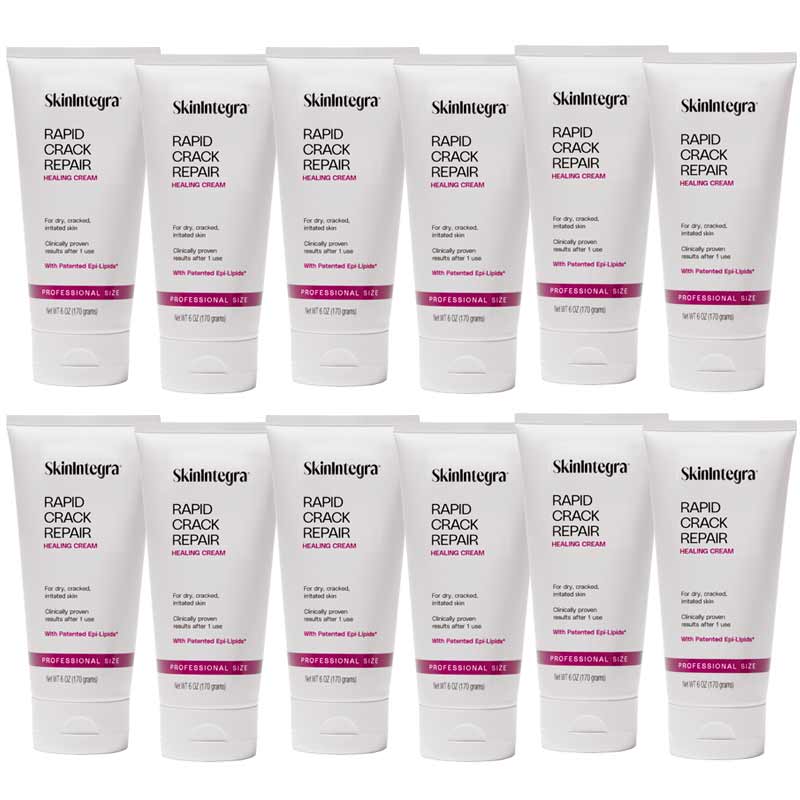Understanding the Skin You’re In: Causes, Symptoms, and Treatments for Hand Eczema
As we navigate the world around us, so much of how we interact is through the use of our hands. However, for some of us, hand eczema can make simple tasks like washing your hair, cleaning your home, or even typing an email a challenge. But that doesn't mean hand eczema has to diminish your quality of life.
With the proper knowledge and effective yet safe skincare formulations in your toolbox, you can take control of your eczema challenges and minimize flare-ups. In this blog post, we'll explore everything you need to know about hand eczema and provide you with the proven tools you need to manage it effectively so you can get back to doing the things you love most without worrying about cracked, dry, or sensitive hands.
What is Hand Eczema?
Eczema is an immune response that often leads to allergic inflammation that presents in the skin. This doesn't mean those with eczema have a weak immune system. In fact, it's just the opposite. In individuals with eczema, the immune system overreacts to allergens, like perfume or chemicals, which leads to skin inflammation. No matter where eczema appears on your body, the symptoms are similar: red, dry, and itchy skin that, in severe cases, can become cracked or blistered.
While there are many different types of eczema (or "atopic dermatitis"), hand eczema is one of the most common. It is also known as "hand dermatitis" or "hand contact dermatitis." Some of the other types of eczema include:
- Contact dermatitis: A kind of eczema that's triggered by a specific substance
- Seborrheic dermatitis: A type of eczema that affects the scalp
- Dyshidrotic eczema: A type of eczema that results in small blisters, typically on the hands or feet
Various studies have indicated that eczema may be related to a Vitamin D deficiency or genetic links, but researchers suspect it is caused by multiple factors, which may differ from one person to the next. Although we don't know precisely what causes eczema, many studies agree that one of the major contributing factors to an eczema flare-up is a breakdown of the skin barrier. The skin barrier is the outermost layer of the skin made up of lipids (a type of fat) that protect the body from external viruses, bacteria, and irritants.
When the skin barrier is weakened, it becomes more susceptible to irritation and infection, leading to eczema flare-ups. In the case of hand eczema, the skin barrier is often damaged by frequent exposure to water, soap, and other irritants. This is why it's so essential to maintain a healthy skin barrier when you have eczema or other chronic skin conditions.
What Triggers Hand Eczema?
If you have hand eczema, you've probably noticed that certain substances or events can lead to a flare-up, which often varies from person to person. Unfortunately, this can make it challenging to figure out what triggers your hand eczema if you can’t pinpoint what these substances or events are.
If you cannot figure out your hand eczema triggers by keeping meticulous notes on when and how your flare-ups occur, your doctor may be able to do a skin patch test to identify whether it is caused by allergies. However, if environmental factors are causing your hand eczema, learning your triggers may be a process of trial and error.
Some of the most common triggers for hand eczema include:
Exposure to Irritants
Regular exposure to irritants such as soaps, detergents, solvents, and chemicals can trigger hand eczema. For example, one study showed that occupational hand eczema (OHE) is common among hairdressers.
Allergies
Allergic reactions to certain substances can trigger hand eczema. Some of the most common allergic triggers include nickel, rubber, fragrances, and certain types of plants.
Moisture
Moisture may be the culprit of your flare-up if you find that your hand eczema is triggered by frequent handwashing, sweating, or working in a wet environment.
Temperature Extremes
Cold weather, wind, and low humidity levels can significantly impact the strength of your skin barrier, leading to an eczema flare-up. This is why you might notice that in winter, eczema on the hands is worse than in warmer seasons.
Hormonal Changes
Hormonal changes can cause eczema to flare up. For example, one study showed that up to 47% of women experience eczema flare-ups in the week before their periods due to the sudden drop in estrogen levels.
Stress
Because stress can affect the immune system, leading to skin inflammation and eczema flare-ups.
Eczema or Psoriasis: What Does Eczema on Your Hands Look Like?
Hand eczema can be mistaken for other skin conditions, such as psoriasis or fungal infection. While psoriasis and eczema are both the result of autoimmune responses that cause dry, red skin, they are not the same. Although you can have both psoriasis and eczema, research shows that this is relatively rare.
These are some of the most common symptoms of eczema:
Redness
You may notice hand eczema on the fingers, palms, and knuckles, where the skin looks red, swollen, and inflamed. These patches may look purple or brown if you have a darker skin tone.
Dryness
Your skin may feel dry and rough due to decreased oil production and a weakened skin barrier. Those with hand eczema should regularly use a fragrance-free, gentle moisturizer to avoid cracking or peeling skin.
Itching
Intense itching is a common symptom of eczema. If the area is scratched, this can lead to further irritation. While psoriasis and eczema can both cause itchy skin, psoriasis has been described as more of a burning or stinging sensation.
If you aren't sure whether your skin condition is hand eczema, psoriasis, or another condition, it's best to visit a dermatologist who can help you determine the cause of red, itchy hands.
Image of hand eczema

How to Address Skin Dryness and Cracks from Hand Eczema with SkinIntegra's Patented Barrier Repair Formula

Hand eczema can be a challenging condition to manage, but the good news is that there are effective ways to do so—and self-care is your first line of defense. From reducing stress to avoiding irritants, there are a range of hand eczema treatment options. Along with eliminating or avoiding environmental triggers, finding a repair cream that can soothe, nourish, and promote healing is key on your road to eczema relief and prevention.
SkinIntegra’s Rapid Crack Repair Cream is a novel repair moisturizer that was specifically formulated to help restore cracked hands and feet in individuals with compromised skin such as people with eczema prone skin. Its patented composition is the result of research into all the components of a healthy skin barrier. For that reason, it includes the essential moisturizing and lipid ingredients naturally found in a healthy skin barrier such as urea, lactic acid, hyaluronic acid for moisturizers and essential fatty acids, natural oils and ceramides for lipids.
Rapid Crack Repair Cream is free of common skin irritants which can cause a reaction and slow the natural healing process in cracked skin such as fragrances, dyes, parabens and other harsh preservatives, petroleum-based ingredients, and phthalates.





